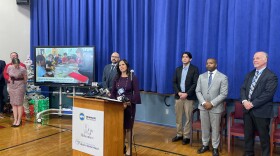The protests that erupted after the death of George Floyd launched the issues of systemic racism to the front of the world’s consciousness. For many children, these recent events and continuing protests in their communities will result in some of their first questions about race and racism.
Research has shown that children can pick up racial biases by the age of 4. While race is a simpler thing to address once a young child notices differences in skin color, racism is much more difficult of a topic to address with your children.
But that doesn't mean that parents should shy away from it. If anything, Children's Hospital of Wisconsin child and family therapist Lakiesha Russell says the earlier parents have conversations about racism, the better.
"We are still learning how to talk about race as adults, even to this day. So it's OK if you don't have all those answers with your kids. But just knowing that the earlier the better with those conversations is best."
"We are still learning how to talk about race as adults, even to this day," Russell says. "So it’s OK if you don’t have all those answers with your kids. But just knowing that the earlier the better with those conversations is best."
Lake Effect spoke with Russell to learn more about how to talk to your kids of all ages about race, racism and the current protests.
How can parents address their own biases and unconscious behaviors that influence their kids?
"Parents [should take some time to do some] some of that introspection, some self-questioning work," Russell says. "Maybe this starts by asking yourself about how you act around a different group of people in the workspace, or in educational systems. 'How do I interact with them, how do I connect with them, have I ever said anything that might have been triggering for them?'"
Should I wait for my child to bring up conversations about race?
"Whether we are doing it consciously or unconsciously, [kids have] already picked up racial biases and standards."
Russell says, you should open up that dialogue with your children as early as possible.
"Sometimes if we wait for our kids to come to us with things, it might be years down the line or it might not happen at all, so I would encourage parents to go ahead and set that ground work."
"At the end of the day, kids pick up on how we respond and react to situations," Russell notes. "Whether we are doing it consciously or unconsciously, they've already picked up racial biases and standards ... and so just keep that at the forefront and that it's not a conversation that you have to be afraid of having."
How can I talk to my toddler about racism?
Toddlers love stories, shows and books, so utilize all of them to share lessons.
"Tap into some of those resources that highlight other characters of other ethnicities in a positive light and just ask your child [about them]," Russell says.
After watching a show or reading a book, Russell suggests asking your child what they think about the show and if they think the characters were treated fairly.
"You want to reinforce that just because you don't look like me doesn't mean that I'm bad," she explains.
Russell recommends starting with this list of children's books.
How can I talk to my elementary-aged child?
"[Ask them] what have you been hearing in the news about what's going on? How does that make you feel? How do you think we can help?"
Russell says that when it comes to talking to kids ages 6 to 12, it's good to have more direct conversations.
"[Ask them] what have you been hearing in the news about what's going on? How does that make you feel? How do you think we can help?"
How can I engage in meaningful conversations with my teenager?
"Teenagers really want to take part in what's going on and be that change, and I would just encourage parents to process that with them and not be afraid to do that with them," Russell says. "Because I feel like this generation will be the change that we've been waiting for."
Russell notes that parents can also find ways outside of marching in a protest to engage in with their teens — whether it's on social media or having these conversations in your own home and extended family.
>> Young, Black Leaders Step Up In Milwaukee Protests To 'Take Back Power That Was Taken Away'
What if I want to take my child to a march?
Before you go to a march, Russell says to make sure your young child knows why you are there. "Have that direct conversation talking about the inequality with this group of people and that we want to come together to support them so that things are equal and fair," she explains.
Adding some "real time moment" for kids to understand will also help them connect to the cause, such as if they felt there was a time they were treated unfairly.
How can I make a safe space for my kids to feel comfortable having these conversations?
Russell says the number one thing you can do as a parent is actively listen to your child. "As a parent, we want to be able to have all the answers then and there and be able to create that dialog," Russell says. "But it's OK just to listen and absorb everything that [your children] are saying and then come back to things if you're not really sure how to respond."
Keep in mind these are not one-time conversations, so make sure your kids know you are not judging them and that they can come back to this topic with you.
How can I help my kids empathize with others and model anti-racist behaviors?
"I feel that once we can tackle and tap into the lens of how does it make the other person feel, I feel like that better helps up to empathize and have compassion for others," says Russell.
The best way to do that is by sharing true stories about the injustices and inequalities black people experience, she says. Be candid, real and honest, "but not in a way that scares kids into empathizing with others."
After sharing stories, you can take the emotional response and words from your kids to go into the deeper dive of the importance of equality and justice.
What if my child has seen a traumatic video such as the one documenting George Floyd's death?
First, as a parent, Russell says you need to be in the right mindset to talk about traumatic videos. "If you've seen the video and you're triggered by it, get yourself regulated first before having this conversation with your child," she explains.
Start by simply asking your child, especially if they're teenagers, "Have you seen the video?"
If younger kids are in the room while the news is on and a video comes up, immediately turn it off and help them process what they've seen to open that dialogue. But if you feel you don't have the proper tools to help your children process what they've seen, get professional help.
"If your child is constantly worried about their own safety, trouble sleeping, not eating, then it might be time to tap into a therapist to help them process that trauma that they experienced from watching that," says Russell.
Recognize that black parents need to have different conversations with their children
"I would like parents to know that for us as black parents, we often have to think twice as hard in terms of our kids' safety," Russell says. "And along those lines, I feel like it does comes with the adultification of our black and brown boys and girls in our society, which often entails that police brutality."
Russell encourages black parents to also advocate for their children, especially in school. From visiting your child's school, to parent-teacher conferences and school events, "Show your face and be immersed in that. Because then I think that allows the teachers and the school to know that this parent is willing and able to connect with us and engage with us."
Parents: continue to have an open mind
"I would tell parents to continue to be open-minded, and if you need help, it's OK to ask professionals, or maybe ask trusted friends or family members that can help bridge this dialogue," says Russell.
"And then I'm a firm believer in reading. There's so much literature out there about racism, how to talk to kids, how to make change within systems of systemic racism — and so I would encourage parents to tap into every possible resource."






